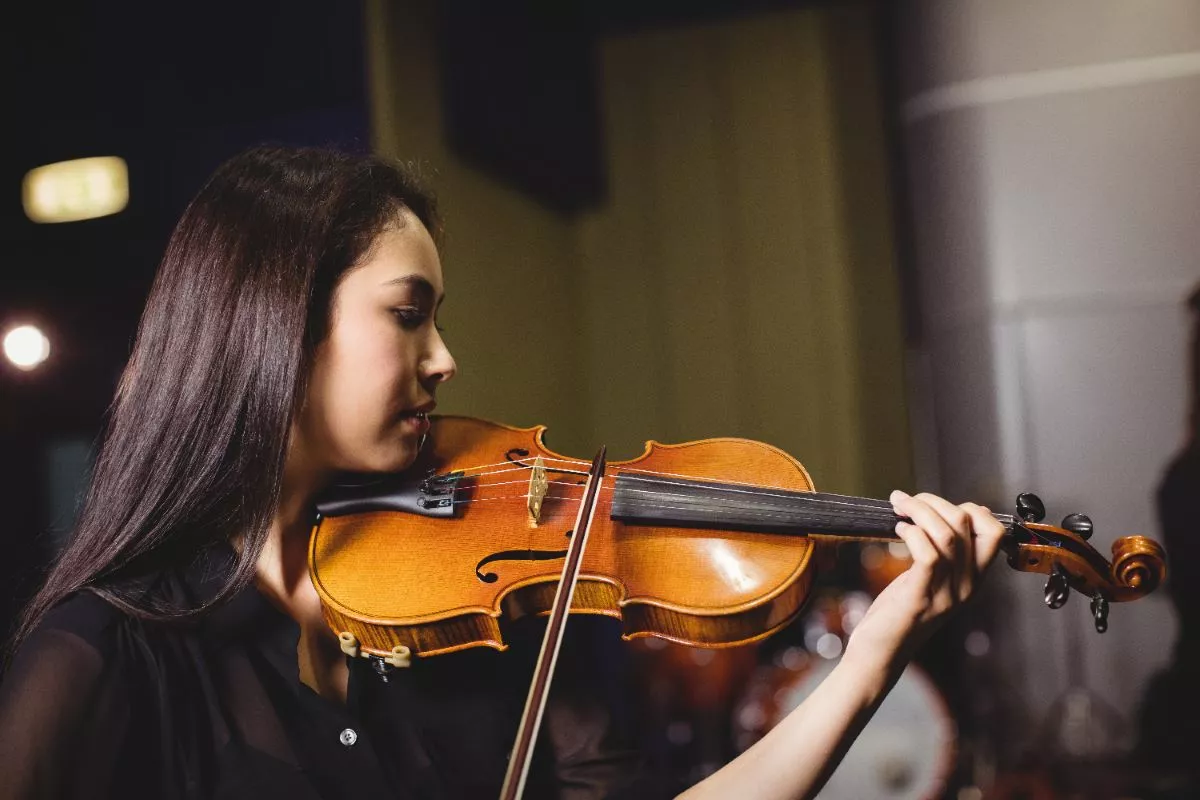
The intermediate violin level represents a crucial stage in a student's violin studies, where foundational skills are solidified, and more advanced techniques and interpretive abilities are developed.
At the intermediate level, violin lessons are typically extended to 45 minutes. This longer session allows for more in-depth work on technique, repertoire and musical interpretation, providing the time needed to tackle more challenging material.
Intermediate violin lessons continue to be taught one-to-one, allowing for a focused and personalized approach. This individualized attention helps address specific technical and musical needs, enabling students to refine their skills and develop their unique artistic voice.
Weekly lessons remain ideal at this stage. Regular sessions provide structured guidance, ensuring students maintain steady progress while tackling increasingly complex repertoire and technical challenges.
The intermediate stage aims to develop the following abilities in the student:
TAKE THE FIRST STEP
To assess your progress as an intermediate violin student, you can consider the following factors.
Are you using the right muscle effort required for playing the violin? A good balance between necessary muscle effort and relaxation is key to maintaining control and avoiding tension.
Are you able to perform studies and pieces while combining technical skills with musical expression? The ability to integrate what you’ve learned technically with the emotional and aesthetic aspects of music is a sign of progress.
Do you have a broad knowledge of works from different periods and styles? Being familiar with your instrument’s repertoire and interpreting works with sensitivity and imagination shows you’re growing as a musician.
Can you perform pieces from memory, interpreting them according to the style and musical text? Mastering works from memory and showing a deep understanding of their structure indicates strong progress.
Are you developing your own interpretive style within the boundaries of the music? Progress is also seen in your ability to interpret pieces with increasing independence and flexibility.
Are you able to solve technical and interpretative issues more autonomously? As you grow, your ability to resolve challenges independently and refine your technique will improve.
Are you able to perform a program suitable for your level with communication skills and artistic quality? Performing in front of others with confidence and maturity shows that your personality as an artist is developing.
Have you improved key technical aspects like position changes, vibrato, sound quality, and pitch? Continuous development in these areas is a clear sign of progress.
Are you engaging in lessons with a pianist or other musicians? Working with an accompanist or ensemble is essential for enhancing your overall musicianship and ensures you are developing in a well-rounded manner.

Here is where the physical problems of technique are worked on in isolation. Technical exercises reduce fundamental technical problems to their essentials, which form the basis of difficulty. The student works through a wide repertoire of exercises, making it easier to tackle challenges in both pieces and studies.
They address technical issues within a broader musical context, linking exercises with musical pieces. Each study presents and develops difficulties from various angles, even in simple studies, requiring both hands to handle simultaneous technical challenges. This integration of technical problems into a cohesive musical framework provides comprehensive training, preparing students to tackle more complex works.
A diverse repertoire of pieces, chosen according to difficulty, is essential for developing an instrumentalist’s interpretative skills. It shapes the student’s sensitivity, judgment and understanding of musical forms. Teachers select a personalized repertoire based on each student’s abilities and needs.

When choosing intermediate violin repertoire, it’s important to select pieces that align with your current technical and musical abilities while building on previous achievements. Avoid repertoire that exceeds your skill level, as it may hinder your progress. Consider your unique strengths and challenges, tailoring your choices to suit your personal development. Repertoire should challenge you without being overwhelming, helping you refine techniques, improve musicality and deepen your understanding of different styles. Your growth, maturity and comprehension will guide your selection and ensure steady improvement.
Intermediate violin lessons are a pivotal stage in a student’s musical education, offering opportunities to refine technique, expand artistic expression and develop a comprehensive understanding of the violin’s repertoire. With consistent effort and thoughtful guidance, students at this level can build a strong foundation for advanced study and performance.
Pick your favorite instrument and start making music today!
MUSIC LESSONSHow to enroll
Categories